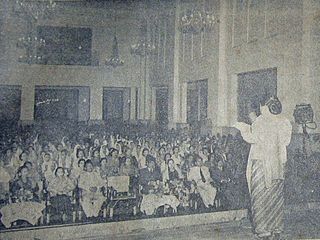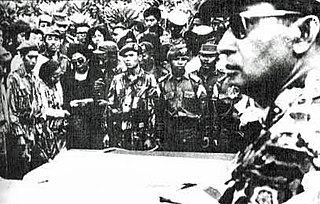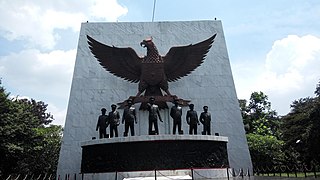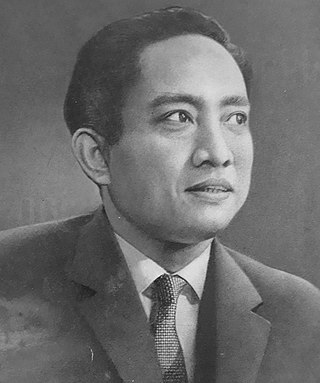
Sukarno was an Indonesian statesman, orator, revolutionary, and nationalist who was the first president of Indonesia, serving from 1945 to 1967.
The Abangan are Javanese people who are Muslims and practice a much more syncretic version of Islam than the more orthodox santri. The term, apparently derived from the Javanese language word for red, abang, was first developed by Clifford Geertz, but the meaning has since shifted. Abangan are more inclined to follow a local system of beliefs called adat and Kebatinan than pure Sharia. Their belief system integrates Hinduism, Buddhism and animism. However, some scholars hold that what has classically been viewed as Indonesian variance from Islam is often a part of that faith in other countries. For example, Martin van Bruinessen notes similarity between adat and historical practice among Muslims in Egypt as described by Edward Lane.

The Communist Party of Indonesia was a communist party in the Dutch East Indies and later Indonesia. It was the largest non-ruling communist party in the world before its violent disbandment in 1965. The party had two million members in the 1955 elections, with 16 percent of the national vote and almost 30 percent of the vote in East Java. During most of the period immediately following the Indonesian Independence until the eradication of the PKI in 1965, it was a legal party operating openly in the country. Accused of responsibility for the 1965 army-led coup attempt, the party was banned by General Suharto in March 1966.

Semaun (1899–1971), also spelled Semaoen, was the first chairman of the Communist Party of Indonesia (PKI) and was a leader of the Semarang branch of the Sarekat Islam.
People's Youth was the youth wing of the Communist Party of Indonesia (PKI). The organisation was formed as the Socialist Youth of Indonesia. Initially the organisation was set up on the initiative of then Minister of Defence Amir Sjarifuddin, as the youth wing of the Socialist Party of Indonesia. A congress was held on 10 and 11 November 1945, where seven locally based youth outfits merged. Rapidly it gained a membership of around 25,000. The organisation took part in the armed struggle for independence during the Indonesian National Revolution. Pesindo units were engaged in intense street fighting during the Battle of Surabaya.

Gerwani was a women's organization founded as Gerwis in Semarang, Central Java, on 4 June 1950.

Indonesia's transition to the New Order in the mid-1960s ousted the country's first president, Sukarno, after 22 years in the position. One of the most tumultuous periods in the country's modern history, it was also the commencement of Suharto's 31-year presidency.

The Thirtieth of September Movement was a self-proclaimed organization of Indonesian National Armed Forces members. In the early hours of 1 October 1965, they assassinated six Indonesian Army generals in an abortive coup d'état. Later that morning, the organization declared that it was in control of media and communication outlets and had taken President Sukarno under its protection. By the end of the day, the coup attempt had failed in Jakarta. Meanwhile, in central Java there was an attempt to take control over an army division and several cities. By the time this rebellion was put down, two more senior officers were dead.

Dipa Nusantara Aidit was an Indonesian communist politician, who served as General Secretary of the Communist Party of Indonesia (PKI) from 1951 until his summary execution during the mass killings of 1965–66. Born on Belitung Island, he was nicknamed "Amat".

Munawar Musso was an Indonesian revolutionary and political figure who was the leader of the Communist Party of Indonesia and one of the key figures in the 1948 Madiun affair.

Guided Democracy, also called the Old Order, was the political system in place in Indonesia from 1959 until the New Order began in 1966. This period followed the dissolution of the liberal democracy period in Indonesia by President Sukarno, who centralized control in the name of political stability. He claimed to have based the system based on the traditional village system of discussion and consensus, which occurred under the guidance of village elders. On the national level, however, this meant centralized rule under Sukarno: martial law, a massive reduction in civil liberties and democratic norms, and the Indonesian National Armed Forces and Communist Party of Indonesia acting as major power blocs.

The Indonesian National Awakening is a term for the period in the first half of the 20th century, during which people from many parts of the archipelago of Indonesia first began to develop a national consciousness as "Indonesians".
This is a list of activities carried out by the U.S. Central Intelligence Agency in Indonesia.

Large-scale killings and civil unrest primarily targeting members and supposed sympathizers of the Communist Party of Indonesia (PKI) were carried out in Indonesia from 1965 to 1966. Other affected groups included alleged communist sympathisers, Gerwani women, trade unionists, ethnic Javanese Abangan, ethnic Chinese, atheists, so-called "unbelievers", and alleged leftists in general. According to the most widely published estimates at least 500,000 to 1 million people were killed, with some estimates going as high as two to three million. The atrocities, sometimes described as a genocide or a politicide, were instigated by the Indonesian Army under Suharto. Research and declassified documents demonstrate the Indonesian authorities received support from foreign countries such as the United States and the United Kingdom.

The Acoma Party was a communist party in Indonesia. It evolved out of the Young Communist Force. Acoma was converted into Partai Acoma on 8 August 1952. Acoma/Partai Acoma was led by Ibnu Parna.

Communism in Sumatra has historically had an influence in the politics and society of Sumatra. Padang, Pariaman, Silungkang, Sawah Lunto, Alahan Panjang, and Suliki of West Sumatra have been cited as an area which was particular active in communism.
A communist front is a political organization identified as a front organization, allied with or under the effective control of a communist party, the Communist International or other communist organizations. It is a structure used by Communist and left-wing parties to intervene in broader political movements. They attracted politicized individuals who were not party members but who often followed the party line and were called fellow travellers.
The Indonesia Party, better known as Partindo, was a nationalist political party in Indonesia that existed before independence and was revived in 1957 as a leftist party.
Asmu, whose birth name was Asmoe Tjiptodarsono, was a leader, theoretician, and chief agricultural expert of the Indonesian Communist Party (PKI) and head of the Communist-affiliated Peasants Front of Indonesia in the mid-1960s. He was killed during the Indonesian mass killings of 1965–66.
The Fifth Force was a proposed military branch of the Armed Forces of the Republic of Indonesia. Conceived by the Indonesian Communist Party (PKI), it represented an initiative aimed at mobilizing armed workers and peasants.












